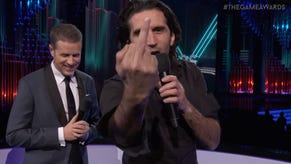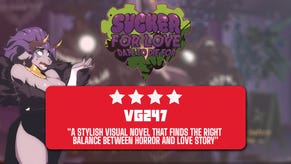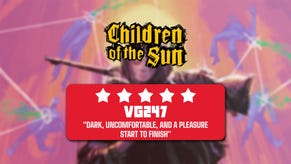A Way Out Review
Flying the coop, with a pal and well-timed QTE at your side.
This article first appeared on USgamer, a partner publication of VG247. Some content, such as this article, has been migrated to VG247 for posterity after USgamer's closure - but it has not been edited or further vetted by the VG247 team.
The first choice you face in A Way Out is an expected one: choosing your character. You're in an airplane, flying to some unknown destination, when you get the option to choose which character you're controlling. This is before you even really know them. Their mini-biographies tell the player about this much: there's Vincent, who's grizzled, older, the more rational sort; and Leo, who's younger and more of a loose cannon. I opted for Leo, while my couch co-op partner chose Vincent.
A Way Out is a purely cooperative game, as in, it's impossible to play it alone. (Unless you have four hands and a fantastic attention span.) You must play with a companion, whether they're someone on the couch or someone you play with over its online servers (though there is no matchmaking). Regardless, co-op is essential in this split-screen adventure game, even if "working together" often boils down to one player running a distraction as the other does something lightly nefarious. It's mostly an adventure game, with players navigating dialogue options and QTEs with finesse (the latter are far and few in-between). There are sequences of hand-to-hand and gun-equipped combat too, which are often the low points.
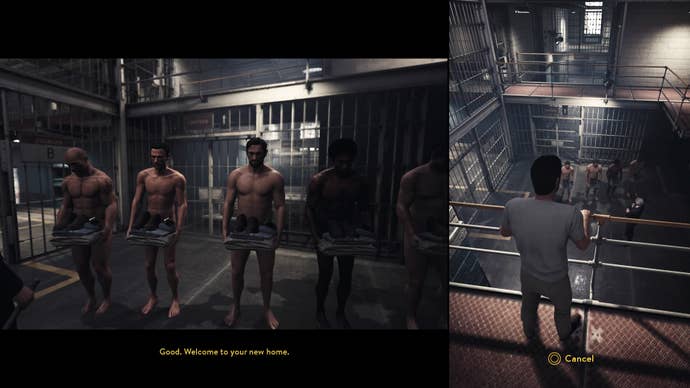
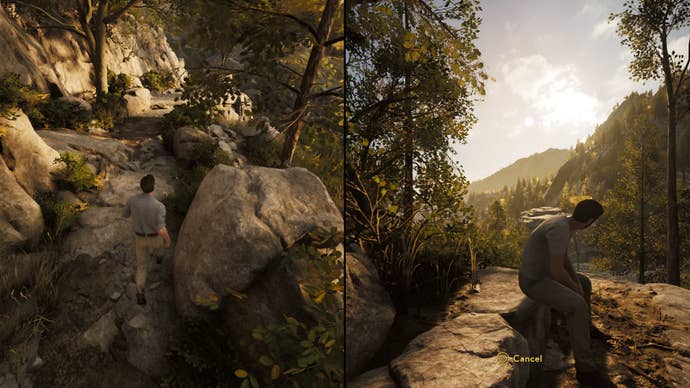
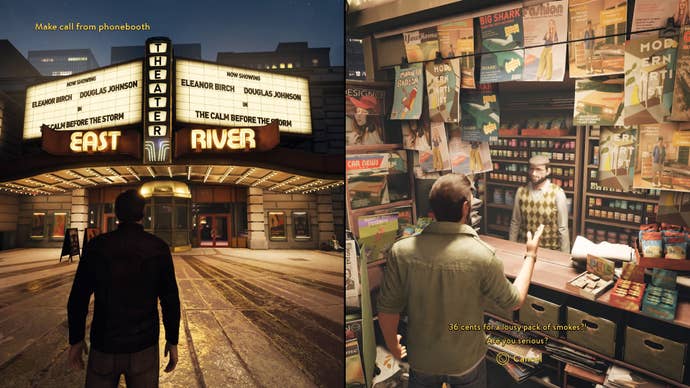
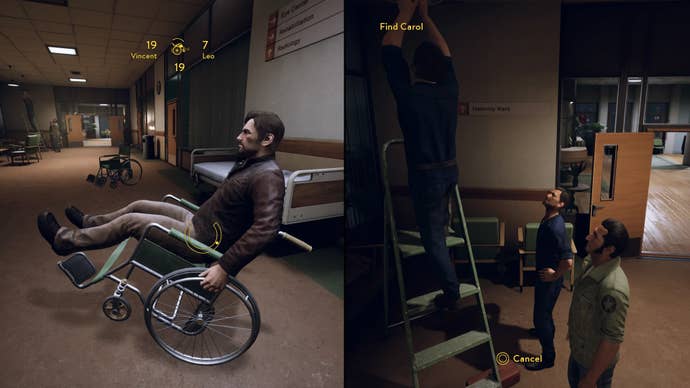
At the start of the game, Leo and Vincent are strangers. Leo's a seasoned prisoner in jail, imprisoned for armed robbery. Vincent, on the other hand, is a new prisoner, jailed for a murder he didn't commit. The two discover they have a common enemy: the same person is the source of their misfortune. For Vincent, it's a vendetta: he's framed for the murder of his own brother. For Leo, it was a backstab, as their common enemy was once a partner of his in crime. That is before, well, the backstabbing bit.
Vincent and Leo agree to team up, albeit reluctantly, to escape prison and then, against the odds, take down the source of their misery. This is where A Way Out gets a little bumpy. Initially escaping prison with a comrade at my side was a delight, as we puzzled our way out of hairy situations, slyly discovering tools and smuggling them through vents, windows, and more. The prison break itself, and everything leading up to it, requires a lot of teamwork: from one player keeping an eye on patrolling guards while the other uses a chisel to hack away at a wall, to the two linking arms back to back and using one another as leverage to scale parallel walls. The latter sequence is a high point of the prison escape, requiring a lot of communication as we timed our steps in sync with one another; sometimes, admittedly, it lead to us swearing at each other in exasperated frustration.
These moments of working together in unison is where A Way Out is at its best. I felt like I needed Vincent, and my partner felt like he needed my Leo. There's no situation that's doable without the other, and like the wall scaling incident, it leads to some altercations—both in the game and in real life. Just like any good co-op game.
Sometimes working together falls to the wayside though. The combat sequences, for the most part, are like many other games. The melee amounts to hitting one button (and occasionally the Counter button) a lot, while shooting feels arduous in terms of aiming. In one section where Leo and Vincent find themselves in a jungle-like environment, the action sequence felt like a B-Side to an Uncharted game, only with worse shooting. The scenarios amounted to crouching in cover, popping out to slowly move your reticle to get a headshot, and ducking back down to recover health again. And it felt bad.
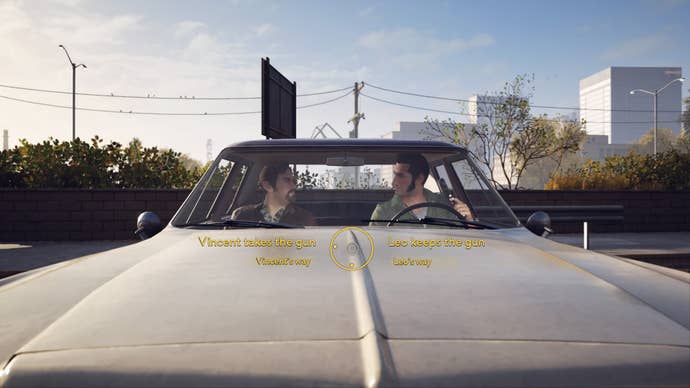
Luckily these combat sequences are relatively few, even if they feel like they take ages because of how rough they are. (This was the point where I had to coax my partner who usually doesn't like games and tell him that I think we were sorta nearing the end.) The game as a whole takes about six-to-eight hours on a first playthrough, depending on how many side activities and minigames you go out of your way to complete, like playing an arcade cabinet. There's a fair amount of replay value too, with the option to play the game as the character you didn't choose at the start (this is also swappable upon exiting the game and re-entering it, so one's not necessarily stuck with Vincent or Leo the whole way through) and choose their dialogue choices firsthand instead of just hearing what the other player chooses. There are also several different "big" choices that can play out differently depending on the players' unified decision, including an intense one at the end.
Most of the "big" choices in A Way Out boil down to finding a way out (haha, get it) of a seedy situation. An early choice sees Leo and Vincent on the lam after having escaped prison, when they come across a bridge. They have two options here: they can take out the nearest police officer that's posted up on the bridge, steal their car, and speed across the bridge for a quick getaway, or they can be more stealthy with it and go under the bridge by walking across its metal beams, being careful the entire way. The problem with the latter is Leo's afraid of heights. The problem with the former is that it's kinda stupid and reckless, even if it'd probably work. Luckily, there's no time limit on making these choices. My partner and I stopped for a moment, discussed the options, and opted for the safer choice in crossing the bridge. Poor Leo had to suck it up for a change.
The structure of A Way Out and its focused understanding of the trials and tribulations of working together heighten an otherwise dull story. Vincent and Leo have depth as characters, but the prison escape and revenge mission do little to inspire ire in the player. My partner, nor I, ever felt compelled to actually get revenge on the Big Bad. If anything, the only thing ushering us forward was seeing what co-op antics we'd get into next, even if the middle of the game loses most of the endearing co-op puzzles that the start of the game is loaded with. The story itself only gets truly compelling near its end.
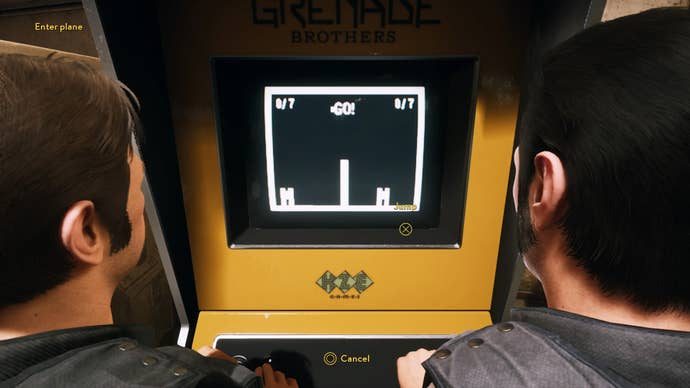
If A Way Out were a television show or a movie, it'd be boring and borderline corny. But in making it a co-op game, Leo and Vincent feel like extensions of the players. They're more engaging because we're the ones controlling their conversations and making choices on their behalves, even if for the most part the choices affect very little: threatening someone or kindly talking out of a situation usually gets the same result, no matter whose way of doing things you choose. As the split-screen sways back and forth (such as one player doing something mundane like lingering around a water cooler and having only a small sliver of the screen, while the other having a serious conversation takes up three-fourths of the screen), the game's envisioning of a co-op adventure feels wholly unique as a shared experience unlike other media, even with its lackluster revenge tale.
Overall, A Way Out is a fun ride because of its co-op shenanigans. While the story is nothing to marvel over, its characters blossom beyond their bare opening descriptions, making seeing their journey together through worthwhile. Plus, it's a good exercise in working together with someone, whether it's a loved one, a colleague, or a friend. You'll really hate (or love) them by the time the game is through. If nothing else, A Way Out will be remembered as a great excuse to test the strengths and weaknesses of all your relationships.
ConclusionEven with a cliched story at its center, A Way Out's persistent co-op elevates it to new heights for the newly married co-op adventure genre. The split-screen ebbs and flows according to what's happening with each character, enriching what would usually be a more-typical, stagnant co-op experience. While the middle of the game drags in some sections and finds itself littered with lousy, inessential combat, its first few hours and superb finale sequence are strong enough to make the whole journey worth seeing through.







